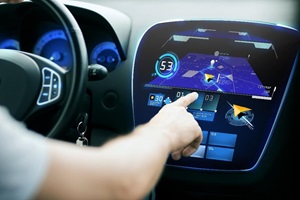- On-Demand Mobility
- Mobility Services
- Transportation Efficiencies
- Autonomous Vehicles
- Apple
The Apple Car Was Always a Long Shot

In February 2015, when word of Project Titan filtered down from Cupertino, California, Apple fans and the tech media instantly whipped themselves into a frenzy that has barely subsided since. However, if a new Bloomberg report is accurate, the never-announced Apple car is now all but dead.
For anyone that gave the premise of Apple building a car serious thought, including yours truly, the concept was always a long shot at best. There is a fundamental disconnect between the way Apple has operated for most of the past 2 decades and the auto industry. With a few rare exceptions like Porsche, automakers have long scraped by on notoriously thin, single-digit margins. Ever since Tim Cook joined Apple in 1998, the company has grown into the most profitable enterprise in the history of the world, with margins that regularly exceed 35%.
Along the way, Apple has created a string of hit products that built on its core competencies of computers and user experience. Building cars would have required several new sets of skills that were completely foreign to Apple. (That’s not to say that a company with $200 billion in the bank and an extremely capable leadership team couldn’t have developed or acquired the necessary skills.)
However, if there is one thing that many (although apparently not all) in Silicon Valley have learned from watching Tesla over the past dozen years, it is that building a car is orders of magnitude more difficult than building a messaging app or a smartphone. The complexities of the supply chain are vast, and the regulatory requirements are labyrinthine.
Automotive Transformation
However, Apple is coming at the automotive space at a time when we are on the verge of the biggest inflection since the Model T. As described in Guidehouse Insights’ Transportation Outlook: 2025-2050 report, the autonomous car may be about to take over from the human driver, and we may be shifting from individual car ownership to on-demand mobility services.
To a degree, this would actually be a very good time for Apple to jump in. Apple is a company that likes to control the user experience, and offering an on-demand mobility service where it doesn’t have to sell individual vehicles might actually be a great fit. On the other hand, that same desire to provide a reliable, consistent experience may be working against the company, as we are on the bleeding edge of autonomous vehicles. Apple prefers to let others go first and then learn from their lessons. It didn’t build the first MP3 player, smartphone, or tablet, but instead waited to build devices that worked better. If Apple wants to enter the mobility business, it might be better off waiting a few years until more of the technical and legal hurdles have been overcome.
The Bloomberg report indicates that the company is pivoting toward providing a software platform for other automakers. This seems unlikely to be a successful strategy. The aforementioned desire for control clashes with automakers’ preference to provide a distinct user experience to customers, so if Apple offered an infotainment system beyond CarPlay, it is unlikely to be adopted. If the company were to offer an autonomous driving platform, it would be something that’s not consumer-facing and unlikely to appeal to Apple. The bigger automakers are all developing autonomous systems in-house, and the smaller brands are likely to go with the more experienced Tier One suppliers like Delphi or Continental that can offer a turnkey solution.
Only a fool would completely discount Apple in the transportation space or anything else it wanted to try—but holding your breath while waiting for the company’s automotive offering might prove just as foolish.